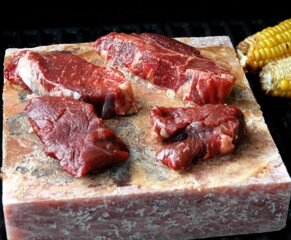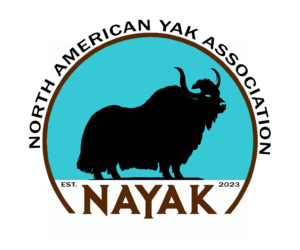
If you are not familiar with yak meat, yak meat is deep red meat that is not gamey, subtle differences in taste than beef and was described by Chef Robert Perry of the University of Kentucky as “silky”. It has been described as having the “health benefits” of skinless chicken and salmon.
Just another “red meat”? In a comparison of grassfed premium and choice angus, bison and grassfed yak sirloin by the University of Kentucky all three were very close in protein at 23-24%, yak had more moisture, and in terms of fat the yak sirloin had 1% fat, bison had 2% and the premium and choice angus were at 5-6% fat.
An analysis performed by Certified Laboratories of the Midwest (Report #168765) of randomly selected ground meat from a grass fed yak raised on average quality pastures in Eastern Kentucky yielded the following results:
- Calories: 231/100 grams
- Carbohydrate: 2.86%
- Total Protein: 19.24%
- Cholesterol: 0.053%
- Oleic Fatty Acid: 4.92%
- Linoleic Fatty Acid: 0.2%
- Linolenic Fatty Acis: 0.11%
- Total Saturated Fats: 8.89%
- Total Monounstaurated Fats: 5.7%
- Total Trans Fats: 0.96%
- Omega 3: Alpha-Linoleic (ALA), Total Omega-3: 0.1%

It is important to note that the nutrition values will vary slightly between grass fed yaks due to differences in the environment and forage in which the yaks were raised.
What is clear in terms of grass-fed yaks: Their meat is high in protein and very low in fat. Furthermore it is low in cholesterol, has linoleic and linolenic fatty acids which lower the risk of coronary heart disease and Omega 3 which is used to reduce risk of inflammatory diseases and depression.
The Yak Meat Market
At this point in time with the exception of two large yak meat producers, breeders market their meat through an area Farmer’s Market (or a store that carries local farm produced produce), private sales, internet sales, or by developing a relationship with a restaurant.
One of the two large yak meat producers supplies a supermarket chain and the second has Pop-up events, supplies five restaurants, does large pop-up sale events, and through a store which has a high demand product line.
Once the market is established, the problem all breeders face, including the two large producers, is meeting the demand. With less than 7500 yak in the entire United States there is no natural supply chain to turn to if demand exceeds supply for a producer.
Producers will search for slaughter ready yak to fill their supply need. But there are only so many yak available. Matching actual supply and expected demand is going to be a critical to the development of an ongoing yak meat business.
The following are current retail prices being charged by four yak meat producers:
Producer #1:
Ground yak: $12/pound
Chuck Roast: $26 for a 2 pound roast
Yak Snack Sticks: $15 for 4oz package
Yak Jerky: $12 for a 3oz package
Producer #2
Ground yak: $25/pound
Yak Burgers: 3×5.3oz burgers (1lb) $21.00
New York Strip Steak: $33 for a 10oz steak
Yak Sirloin steaks: 2 8oz steaks for $45
Rib Eye: 11oz for $47
Filet Mignon: 12oz for $55
Producer #3
Ground yak: $12.95/pound
Yak Burgers: 3×5.3oz burgers for $13.19
New York Strip Steak: $17.95 for an 8oz steak
Rib Eye: $18.67 for 8oz
Sirloin Steak: $12.97 for an 8oz steak
Order to sell Tenderloin: $19.97 for 6oz
Yak Stew meat cubes: $10.60 for 8oz
Producer #4
Ground yak: $15/pound
Ground Sirloin: $15/pound
Yak Stew Meat: $15/pound
Boneless Ribeye: $15 for 0.59lb
Bone on Ribeye: $45 for 1.5lb
Filet Mignon: $13 for 0.29lb
New York Strip Steak: $24 for 1lb
Sirloin Steak: $14 for 1lb steak
Top Round Roast: $15 per pound
In order to sell yak meat to the public the animal has to be slaughtered at a USDA inspected facility or, in some states a state certified facility will allow you to sell within that state. The USDA treats yaks as an exotic species, so yaks fall under the USDA’s triangle stamp program. The rules governing this program allow meat from yak/cattle hybrids to be labelled as yak meat as long as the animal is 39% yak. A yak x beef hybrid will have different meat characteristics in terms of texture, taste, amount of fat (and marbling), cholesterol etc. What yak meat producers are doing is to have the slaughter animal’s DNA tested to be able to show the meat is not from a hybrid yak. Others operate a “closed herd system” in which all the yak cows and bulls involved in producing the yaks to be raised for meat have been DNA tested to prove that they are true yaks.
The North American Yak Association has worked with the USDA to develop a “Certified Yak Meat” label which is affixed to the meat packaging at the slaughter facility. This label certifies that the meat bearing this label was from a yak which was genetically tested and was found to be a full blooded yak. Certified yaks for slaughter are required to meet the same rigorous purity standards as registered full-blood yaks.

The Association wishes to offer a higher standard. Meat products bearing the NAYAK Certified label are meat products from yaks that have been genetically tested, and found not to be hybrids. Certified yaks are required to meet the same rigorous purity standards as registered full-blood yaks.
